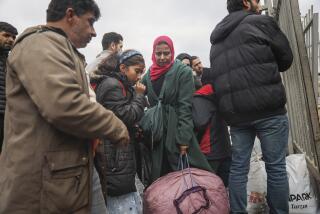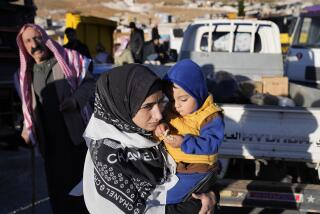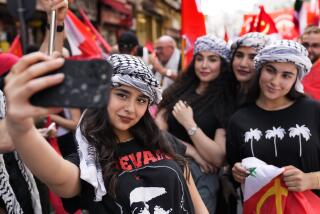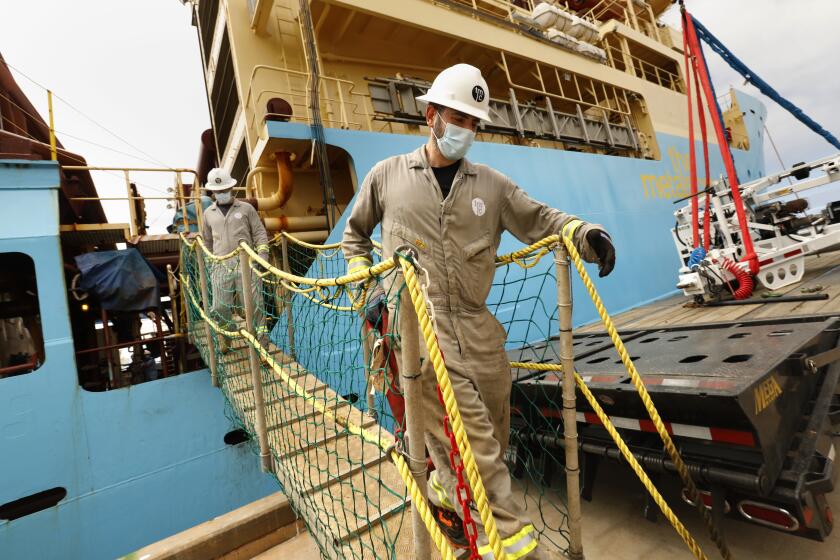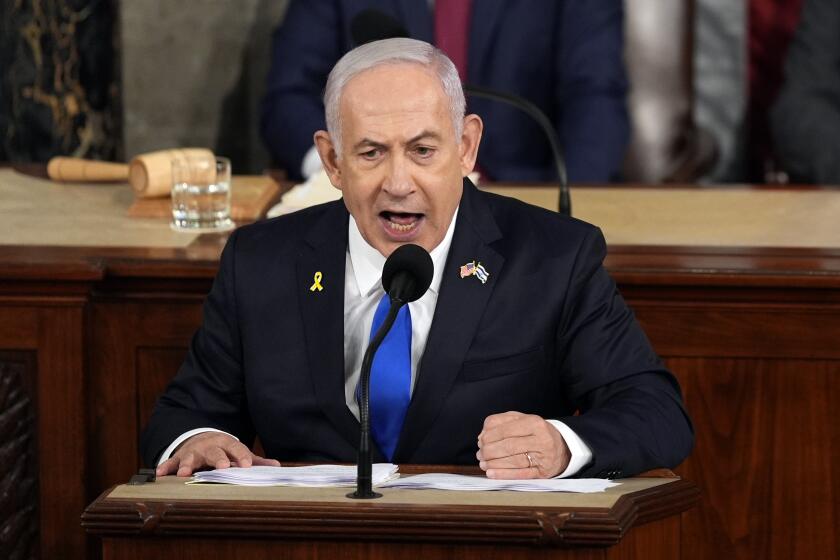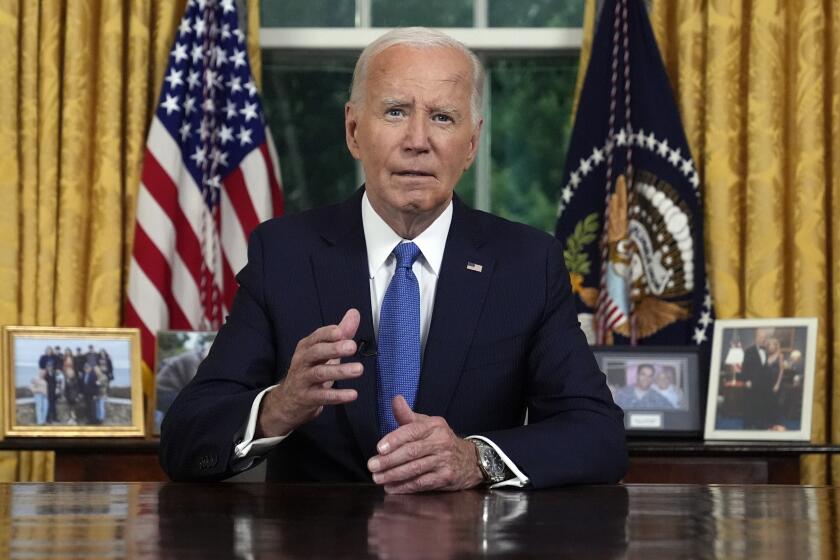Syria protests swell as tens of thousands turn out
Antigovernment demonstrations sweeping Syria appeared to have crossed a threshold in size and scope, with protesters battling police near the heart of the capital and the protest movement uniting people from different regions, classes and religious backgrounds against the regime.
Tens of thousands of people turned out across the country Friday, dismissing minor concessions offered a day earlier by President Bashar Assad. The demonstrators called for freedom, the release of political prisoners and, in some instances, the downfall of the government, echoing demands for change across the Arab world.
Momentum seemed to be with the protesters. Friday’s demonstrations showed vitality, organization, media savvy — and a sense of humor. In the city of Duma, pictures posted to the Internet showed hundreds of marchers holding up yellow “penalty” cards in a soccer-inspired caution to the government that the movement is losing patience over unfulfilled promises of reform.
But it was the spread of large-scale protests into new corners of Damascus, the capital, and Assad’s seat of power, that underscored the growing depth of the protest movement.
“Today was the first time such a huge protest showed up in the capital,” said Razan Zaitouneh, a human rights lawyer in Damascus. “It’s a clear response to the authorities’ claim that people will be satisfied with its silly reforms like changing the government.
“It also means that people are not afraid anymore,” she said, “even after all the violence, the terrible torture of detainees, in spite of all that, people are still going to the streets in larger and larger numbers.”
The government flooded city streets with plainclothes and uniformed security officers. Nearly 150 plainclothes officers stood outside the capital’s historic Umayyad Mosque as Friday prayers ended, menacing worshipers as they walked out and overwhelming them with pro-government chants.
Assad’s new Cabinet lineup and the release of some prisoners failed to mollify demonstrators, as did an earlier effort to dissuade new protests by depicting the antigovernment movement as led by foreign agents and Islamic extremists.
Assad, his father, Hafez Assad, before him and their Baath Party elite have held power for decades with the implicit threat that any weakening of the state would plunge the nation, made up of a mosaic of religions and ethnicities, into the kind of sectarian strife that has plagued neighbors Lebanon and Iraq.
For now, the protest movement shows no sign of religious or class divisions. In Dariya and Moadamyeh, mixed Christian and Muslim suburbs of Damascus, demonstrators held banners reading, “No to sectarianism.”
“What is clear is that it’s not an Islamist revolution and it’s not a sectarian revolution, even though the regime tries to do everything to present it that way,” said Mohammed Ali Atassi, a Syrian journalist in Beirut. “I’m not surprised how aggressive the regime is in its criminal actions. I’m surprised at how peaceful the protesters are. They understand that any violence coming from them is the end of the movement.”
Atassi suggested that a democratic transition in Syria might resemble the course of the Tunisian and Egyptian revolutions, which brought down longtime leaders, rather than the Libyan or Bahraini uprisings, which appear to have exacerbated tribal and sectarian differences.
“It’s impossible for the Libyan scenario,” he said. “This is a country with 22 million people and two big cities with millions of people. We’re an urban society.”
Friday’s demonstrations also showed the growing geographic reach of the dissent. Large demonstrations were reported in the suburbs of Damascus; the cities of Dara, Homs, Aleppo, Baniyas, Dair Alzour and Latakia, where at least two were reported killed; and smaller towns and villages.
Hundreds turned out in the west-central city of Hama, the site of a brutal crackdown by Assad’s father against Islamic activists in 1982, which had been quiet until now. Amateur videos posted online show protesters there shouting, “Our blood and our souls for you, Baniyas,” referring to the northern coastal city where several people were killed and hundreds arrested over the last week.
Hundreds of protesters clapped and cheered in another northern coastal city, Jableh, online videos show. In the ethnic Kurdish city of Qamishli in the north, protesters took to the streets despite a recent government decision to grant citizenship to nearly 300,000 Kurds who had been counted as illegal immigrants for decades.
Though inspired by the uprisings in Egypt and Tunisia, the protests in Syria appear to be developing their own themes and slogans.
“The people want to topple the regime,” one protester chanted in an echo of the Egyptian uprising, before the crowd erupted in what has become the simple rallying cry of the Syrian uprising: “Freedom! Freedom! Freedom!”
“My gut feeling is that this is just going to get worse: the number of people, the breaking of the wall of fear, the weekly expansions of protests,” said a longtime Middle East analyst in Beirut, who asked that his name not be published for fear of being targeted by the Syrian government.
“It’s like a virus in the way it is spreading,” he said. “The wall of fear is declining and not increasing. Every time there’s an incident and people are killed, anger rises. I don’t see how the protests are going to de-escalate.”
As night fell Friday, protesters battled with police in an attempt to break through to the center of Damascus. Security forces, which have allegedly killed at least 200 people and jailed hundreds of others since the unrest began, responded mostly with tear gas fire and batons, which seemed only to embolden the protesters.
And in a sign of division among government loyalists, state television journalist Maher Deeb quit in protest, posting a scathing resignation letter on his Facebook page.
“I am no longer able to bear the failed approach of the official Syrian press ... in its coverage of the popular protests ... as well as its failure to cover the practices of some security branches and popular committees that torture, arrest and attack protesters,” the letter, in Arabic, reads.
“Some sick, high-ranking security officers are acting on their own by killing citizens in violation of directives given by the president, and therefore I find myself standing side by side with the Syrian Arab people.”
Lutz is a special correspondent. Special correspondents in Damascus contributed to this report.
More to Read
Sign up for Essential California
The most important California stories and recommendations in your inbox every morning.
You may occasionally receive promotional content from the Los Angeles Times.
